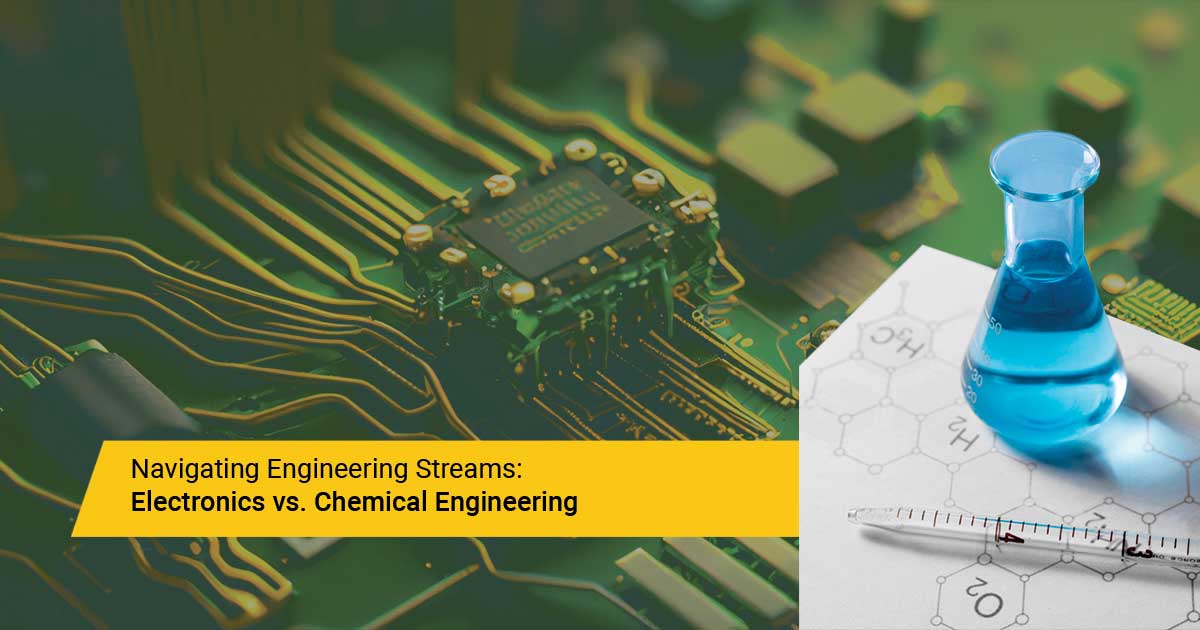FET Blogs


FET Blogs



08 January 2024
Table of Contents:
The demand for Engineering graduates has only grown over the years, prompting a drastic increase in students opting to pursue a Bachelor of Engineering (BE), Bachelor of Science (BS), Bachelor of Technology (B.Tech) or similar graduate programmes. If you find science and technology interesting, whether it is working with a screwdriver or mixing chemicals in a laboratory, you must consider Engineering for graduation. We will look at Electronics Engineering and Chemical Engineering in this blog.
To join an Engineering graduate programme, you can do a Diploma in Engineering after the 10th grade and then transfer to a graduate programme in the same course. Or, to qualify for an undergraduate engineering programme after high school, you must complete 12th grade with Physics, Chemistry, Mathematics and Biology or Computers as compulsory subjects. The minimum scores are 50% in the 12th board exams and appear for entrance exams such as CET, JEE, or GATE. For international colleges, you must appear for SAT and TOEFL or IELTS.
Depending on a student’s interest and aptitude they can choose either stream or opt for integrated courses with these subjects. Some options are –
|
Electronics Engineering |
Chemical Engineering |
|
Electrical and Electronics Engineering |
Biochemical engineering |
|
Electronics and communication engineering |
Chemical Engineering and Biotechnology |
|
Sound Engineering |
Material Science |
The BE/ B.Tech courses curriculum will include classroom time, lab time, theoretical exams, practical exams, viva voce, and projects. Some institutes also offer internship programmes.
Electronics engineering is the study of nonlinear and active electrical components for designing electronic circuits, integrated circuits, devices, and other equipment and systems. It is a branch of electrical engineering that deals with all types of consumer electronic devices, industrial electronics, or research-related electronic equipment. The subjects covered in Electronics engineering are Applied Physics, Mathematics, Electrical Engineering, Electronic Devices and Circuits, Engineering Linear, Engineering Drawing Laboratory, Digital Communication, Digital System, Mechanics of Engineering Design, Circuit and Networks, Control Systems, Instrumentation Systems, Computer organisation, Power Electronics, Micro Electromechanical Systems and Industrial Automation.
Chemical engineering is the study of ideas and techniques for transforming chemicals and raw materials into finished goods. These finished goods can be fuel, paint, textile fabric, or industrial raw materials. Chemical engineers understand the nature of chemicals and naturally occurring materials and how they can be used for solving problems such as developing technology to harness clean energy, increasing food production or making essential goods for society. The subjects studied in a chemical engineering course are Engineering Mathematics, Engineering Physics, Engineering Chemistry, Engineering materials, Fluid mechanics, Mechanical operations, Instrumental methods for analysis, Chemical Engineering, Thermodynamics, Mathematics, Heat Transfer, Optimisation Techniques, Equilibrium, Staged Operations, Polymer Technology, Diffusional Mass Transfer Operations, Statics and Strength of Materials, Process Dynamics and Control, Modelling, Computer simulation & Optimisation, Chemical Technology and Membrane Separation Technology.
With graduation in electronics engineering, you can consider a post-graduate course with a specialisation in –
You can consider careers with MNCs, academics, and public sector organisations. You can work in roles such as –
You can look at job opportunities in research and development, consumer electronics manufacturing companies, the telecommunication industry, defence organisations, IT and software companies, space research companies, and other similar companies.
After graduation, you can choose a postgraduate course with specialisation in domains such as –
You can work in roles such as -
You can work in industries such as plastic, rubber, textile, chemical manufacturing, petroleum industry, fertiliser, or aerospace industry.
Both electronics and chemicals are interesting fields with incredible scope and interesting opportunities. You can also consider pursuing a management or entrepreneurship programme and building a business in the chemical or electronics fields.
A1: Yes, chemical engineers are in high demand in India. The key sectors for chemical engineering, such as oil and gas, pharmaceuticals, food processing, petrochemicals, renewable energy, biotechnology, and environmental management, have consistent demand. With recent initiatives such as "Make in India" and manufacturing growth, demand has increased by around 80% over the past decade.
A2: Not at all. Chemical engineering remains essential in India and abroad. Skilled professionals are needed for everything from traditional industries like oil to emerging areas such as green energy, pharmaceuticals, nanotech, process automation, and sustainable practices. Chemical engineering is an evolving field offering career opportunities in various sectors.
A3: For aspiring chemical engineers in India, science with Physics, Chemistry and Maths (PCM) is the ideal combination at the 12th-grade level. It is important to note that:
Popular Post
17 February 2026
AIE Full Form
10 February 2026
AEIE Full Form
22 January 2026
AE Full Form
16 January 2026
What is Aerospace Engineering?
16 January 2026
What is Chemical Engineering?
Ask an Expert for Free